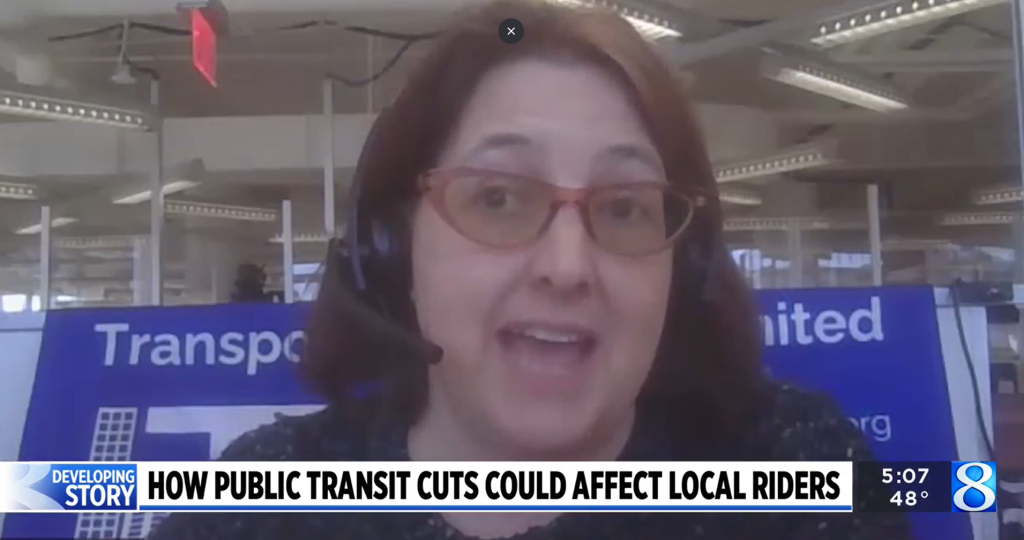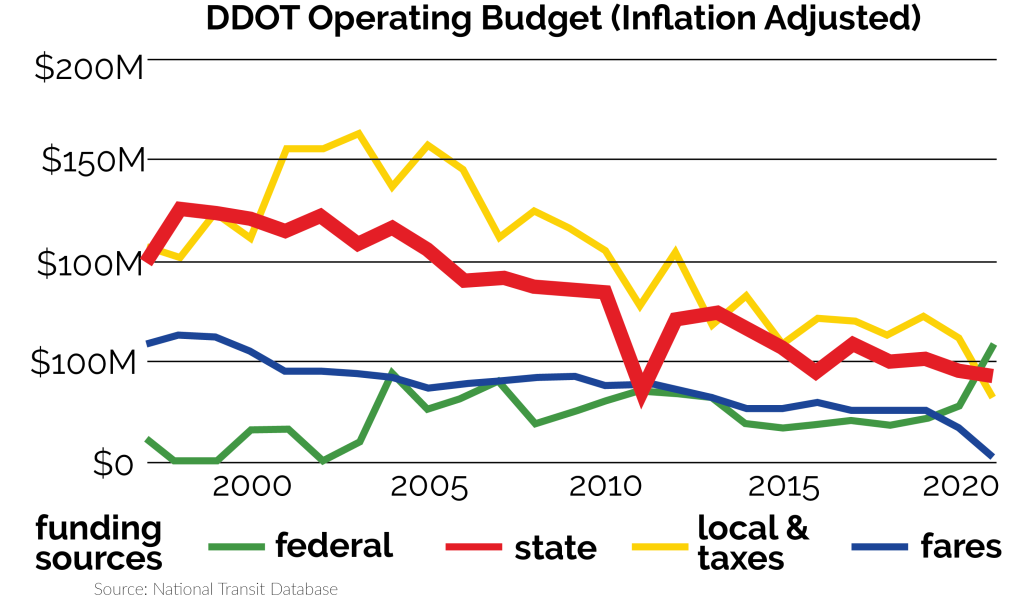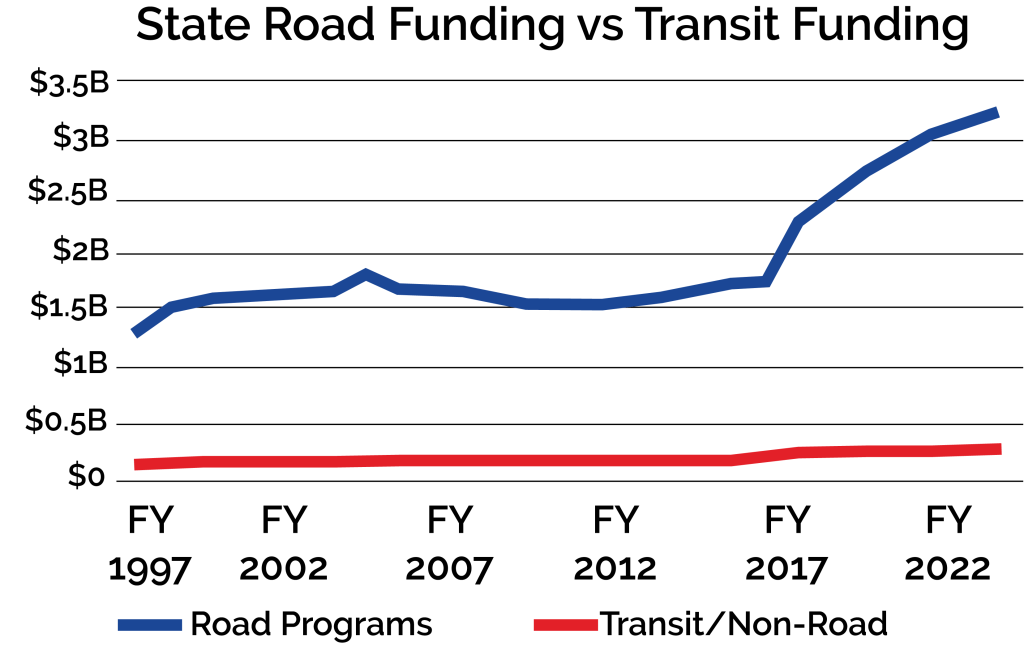Final update 6/27: Disappointing final budget
Despite hundreds of individuals and dozens of organizations speaking out for greater transit funding, the final budget failed to increase or even maintain the funding levels provided last year. The final budget included just $246 million for Local Bus Operating, which must then be divided among 77 transit agencies statewide. And $20 million of that is considered one-time funding that may not be available next year. (Last year’s Local Bus Operating totaled $261 million, including an ongoing $216M and a one-time boost of $45M.)
This is especially concerning because the costs of operating transit across Michigan increased by 9% last year, so anything less than $281 million for LBO means transit agencies taking a cut. This not only threatens SMART and DDOT’s plans to improve reliability and frequency, it will be especially harmful to rural transit agencies with the least wiggle-room in their budgets.
One silver lining – the final budget includes a first-ever e-bike incentive pilot program funded at $2.9 million. Enormously popular in many other cities and states, enabling lower income Michiganders to afford electric-assist bicycles can greatly expand the distances they can travel. Given that 80% of daily trips are less than ten miles in length, living without a car can become realistic for many more people.
We understand that legislators were struggling to fund many important priorities with limited funding. But with a new Legislative Transit Caucus and the MI Healthy Climate Plan and the Growing Michigan Together report both highlighting the need to improve and expand transit, this budget is quite disappointing.
So this summer, TRU will redouble our efforts to help legislators understand how essential transit is, by inviting legislators to come ride the buses with us and by encouraging transit supporters to Ask Candidates about Transit throughout the election season. Stay tuned to TRU’s emails for details on both.
Update 3/15: House Committee hears consistent calls to boost transit funding
The House Appropriations Subcommittee on Transportation held a hearing Tuesday focused on public transportation, which you can watch on YouTube.com/DetroitTransit. Before an overflow crowd and key legislators, transit stakeholders presented on the importance of public transportation and a boost in transit funding:
- MDOT officials from the Office of Passenger Transportation and the Office of Rail each presented
- OPT reported that the costs of operating public transit in Michigan increased 9% last year. Without a major boost above the Governor’s initial budget proposal (of 2%), transit agencies will receive the lowest state reimbursement level in decades (ever?)!
- The Rail office explained that they got federal funds to plan how to improve current rail service and consider expansion to Toledo and Windsor.
- Harmony Lloyd of SMART presented on behalf of the Michigan Public Transportation Association (starting around the 48 minute mark)
- She spotlighted real-life examples of how Local Bus Operating dollars are spent, like getting Roscommon seniors home from hospital visits in other counties and connecting Ypsilanti workers rapidly to Ann Arbor jobs.
- Megan Owens, Director of Transportation Riders United presented (at 1:08), emphasizing that transit can no longer be treated as an afterthought, especially given the importance of transit in:
- Ensuring affordability to Michigan families who are struggling with the high costs of driving;
- Talent attraction, as the Growing Michigan Together Council reported; and
- Meeting Michigan’s climate commitments, from the MI Healthy Climate Plan.
- Amalgamated Transit Union representatives spoke (at 1:12)
- Michigan Association of Rail Passengers commented (at 1:19)
MPTA, TRU, and other supporters shared with the Committee a letter signed by more than twenty groups urging them to prioritize Local Bus Operating funds.
Update Feb 26: Media attention to transit budget

The media are starting to listen:
- Last week, the ABC affiliate in Grand Rapids – WOOD TV – ran a story spotlighting “How public transit cuts could affect local riders”
- They quoted TRU’s Megan Owens that “Public transit can’t afford to be moving backwards when so many more people want affordable ways to get around.”
- Today, Crain’s Detroit Business reported: “Legislators aim to get serious about improving public transit”
- “The newly formed transit caucus, a group of around four-dozen legislators — more than 40% of those serving — will hold an inaugural meeting this week.”
- “The focus comes as advocates and some lawmakers push back against Whitmer’s latest budget proposal. Funding for local bus operations would drop from $261 million to $221 million, mainly due to a one-time boost of federal pandemic aid ending. Environmental organizations and groups like Transportation Riders United, a Detroit-based nonprofit, are advocating for an increase to $276 million to account for inflation. They ultimately want the state to spend at least $350 million annually. That would bring its share of operating assistance reimbursements to 80 transit agencies to 50% in urban areas and 60% in rural areas, the ceilings under current law. The state funded 29% of urban costs and 35% of rural costs in the 2022-2023 fiscal year.”
Update Feb 8: Governor’s budget proposal fails to meet transit needs
Governor Whitmer released her budget proposal Wednesday, which was a disappointment on transit: Out of $6.6 billion for transportation, she proposed $40 million LESS for Local Bus Operating than last year (including one-time and ongoing funds) – proposing just $221M vs $261M last year. We cannot afford to go backwards on transit!!
It wasn’t all bad. She proposed $50 million more for transit and rail capital (vehicles/construction), all from federal funds and increased state transit-restricted revenue. She also proposed to invest $30 million for one-time general fund “Transit Innovation Grants” for “local transit agencies to spur innovation” to “connect Michigan communities.” While those would both be great, they won’t run the buses. Local Bus Operating funds are essential.
And it’s not like Michigan’s too broke to invest in priorities. It’s especially outrageous that the budget includes $25M for vehicle incentives, including $1,000 handouts for buying non-EV, non-union-made cars!
Regardless of her proposal, the Legislature ultimately passes the budget, not the Governor. Tell your state legislator to invest at least $276 million in Local Bus Operating and to work towards long-term state investments in great transit.
.png)
Hundreds of reports, experts, and polls have said that Michigan needs to improve public transit:

- to retain young people and grow Michigan’s population
- to connect willing workers to open jobs
- to minimize the climate crisis for a Healthy Michigan Climate Plan
- to minimize commute times and help alleviate intergenerational poverty
- to enable stable employment for people with disabilities
- to overcome attendance issues for students
- to provide independence and dignity to seniors aging in place
- to compete against other top-tier cities
Time for the State of Michigan to finally invest in great transit!

Through gas, vehicle, and other taxes, the State of Michigan used to fund nearly half the cost of operating local bus services. Community transit agencies in all 83 Michigan counties raised the other half locally.
But over the past forty years, that funding has stagnated, while costs have risen. In recent years, state funds covered less than 30% of local bus operating costs. Some transit agencies raised taxes, others cut back on service. All struggle to provide the mobility Michiganders need.
Michigan needs to boost state investment in transit to make possible the reliable, convenient public transit our communities need.
Instead, Michigan has expanded roads while neglecting transit.

Despite the fact that Michigan’s population has remained basically flat for the past forty years, the state continues to pump more and more money into building and widening roads, sprawling ever outward.
Yet they refuse sufficient state investment in transit. Continuing to do the same things and expecting a different result is the definition of insanity!
Last year’s state budget was a good start

However, much of that funding was considered one-time funding. State transit funding is at risk of going backwards if we don’t fight hard to maintain and boost it. Review TRU’s Transit Action Agenda for Michigan 2024 legislative recommendations (pdf download or review below) for more details.
Join us in urging our legislators for greater state investment in transit, this year and into the future. Our future depends on it!
To maintain transit progress, the Michigan FY25 budget must allocate:
- At least $276 million to Local Bus Operating!! – maintaining the $261M from FY24 and adjusting for inflation
- $168 million for Rail Operations and Infrastructure – a $30M increase to develop plans to expand rail service
- $30 million for the Transportation Alternatives Program to support bike lanes and other nonmotorized infrastructure
- $8 million for an Electric Bike incentive, prioritizing lower income purchasers
Despite less budget surplus this year, this additional $128 million is essential to maintaining transit progress and building towards a great mobility future for all Michigan.
To fully fund the state’s half of Local Bus Operating costs, the legislature would need to allocate about $350 million. That may not be feasible this year, but Representative Jason Morgan is drafting a bill aimed to achieve just that. Stay tuned for details as they become available.
Then urge your friends, family, neighbors, and co-workers to do the same – because legislators all across the state need to hear that Michiganders want more and better transit!
